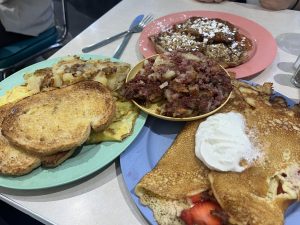The search for serotonin: a rapidly evolving world defines mental health for Gen Z
March 17, 2021
Last week, when I was scrolling on Twitter (rather than enjoying the warmest weather we’ve had in months like a smart person would), I kept seeing a certain buzzword cropping a lot on my dash: serotonin. And the apparent popular lack of it.
Serotonin is a neurotransmitter, or, more simply put, a chemical in the brain. It acts as a mood stabilizer and is associated with feelings of general happiness and wellbeing. It’s often discussed interchangeably with another neurotransmitter, dopamine, which is more tied to motivation and productivity.
More than ever, I see posts all over social media, particularly from people belonging to Generation Z, citing a debilitating absence of serotonin that is leading them to feel frequent symptoms of depression and anxiety. Their brains will just not let them experience happiness. And, the truth is, I too find myself relating to these kinds of posts the more Gen Zers authentically talk about their mental health—and the search for serotonin.
So why exactly is serotonin eluding so many of us?
First of all, there are neurological conditions relating to serotonin deficiency, and I encourage you to seek out medical advice from a professional if you feel you are experiencing low serotonin levels.
With that being said, the easiest way to explain the overwhelming unhappiness of Gen Z would be to blame the pandemic. And, to give credit where credit is due, COVID-19 has been definingly horrific and certainly has contributed to a significant dip in younger people’s mental health in the last year.
But these problems absolutely predated the coronavirus. Don’t believe me? Do a Google search for Gen Z and mental health. While everyone’s Google search results are tailored to the handy online data they leave behind, there’s a high probability you will find some articles from medical websites and mainstream outlets from 2019 with analysts speculating on why we seem so troubled.
Most researchers find Gen Z more likely to be transfixed by social media but also much savvier with it than their elders. On the whole, we are remarkably more fiscally responsible than would be anticipated for people our age, which experts credit to our lived experiences as children watching the 2008 financial crisis unfold.
We are also far more likely than any current living generation to report symptoms of anxiety, depression and other mental health issues, according to the American Psychology Association.
I am by no means a psychological expert, but, based on my own experiences and conversations with other people in Gen Z, there are a few things at play that are constantly weighing on us.
Uncertainty has always been a significant stressor for us; the pandemic only exacerbated it to the nth degree. We’ve seen firsthand that Millennials are burdened by student debt. We are the generation that knows exactly what A.L.I.C.E. training means. Most of us have probably never been in an airport without the TSA.
A seismic shift in the state of American politics over the last two decades has many of us more politically engaged, and some are passionately invested in identity politics. Social media platforms, while incredibly useful and engaging, have added a level of increased social pressure to be recognized and validated by peers and strangers alike. Conversations about sensitive topics such as sexual harassment and assault are regularly making news headlines.
This is all just the tip of the iceberg, so to speak, of the unique circumstances Gen Z finds itself navigating. If I listed all of them, well, I could probably write an entire senior capstone on it. And perhaps the sheer number of stressors in our lives has led to us being much more open and candid, if not brutally honest at times, about our mental health. Or maybe others older than us are helping reduce the age-old stigmatization surrounding mental health concerns.
So if you are looking for some much-needed serotonin, especially during a global pandemic, I wish you all the best in discovering it—and if you are successful, maybe let me know how you found it. Just asking for a friend.



















